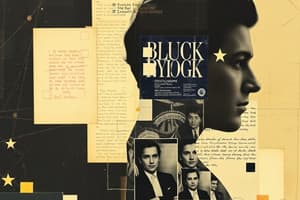Podcast
Questions and Answers
What is one of the characteristics of personality mentioned in the text?
What is one of the characteristics of personality mentioned in the text?
- Behaviors seem to fit together meaningfully (correct)
- Behaviors unrelated to a person's identity
- Behaviors viewed as being solely caused by external environmental factors
- Behaviors that change frequently in response to different situations
According to Freud's Psychoanalytic Theory, what is the role of the ego in personality?
According to Freud's Psychoanalytic Theory, what is the role of the ego in personality?
- Primitive and unconscious part of the personality
- Operates according to the pleasure principle
- Moral arm internalizing societal standards
- Partly conscious executive that balances id, superego, and reality (correct)
Which anxiety type is related to the ego's fear of real-world threats?
Which anxiety type is related to the ego's fear of real-world threats?
- Neurotic anxiety
- Reality anxiety (correct)
- Defense anxiety
- Moral anxiety
In which stage of psychosexual development does psychic energy focus on certain body parts?
In which stage of psychosexual development does psychic energy focus on certain body parts?
What is repression, as described in Freud's Psychoanalytic Theory?
What is repression, as described in Freud's Psychoanalytic Theory?
Which theorist emphasized social interest as a motivation for humans?
Which theorist emphasized social interest as a motivation for humans?
What does the Oedipus complex refer to in Freud's Psychoanalytic Theory?
What does the Oedipus complex refer to in Freud's Psychoanalytic Theory?
Which structure of personality operates according to the pleasure principle?
Which structure of personality operates according to the pleasure principle?
Which defense mechanism involves masking sinister impulses through other forms like art or sports?
Which defense mechanism involves masking sinister impulses through other forms like art or sports?
What does the unconscious realm in Freud's Psychoanalytic Theory consist of?
What does the unconscious realm in Freud's Psychoanalytic Theory consist of?
Flashcards are hidden until you start studying
Study Notes
Personality
- Personality is the distinctive and relatively enduring ways of thinking, feeling, and acting that characterize a person's responses to life situations.
- Aspects of personality have three characteristics:
- Seen as components of identity that distinguish that person from other people.
- Behaviours viewed as being caused primarily by internal rather than environmental factors.
- Behaviours seem to fit together in a meaningful fashion, suggesting an inner personality that guides and directs behaviour.
Psychodynamic Perspective: Freud's Psychoanalytic Theory
- Freud considered personality to be an energy system, powered by instinctual drives, which constantly presses for either direct or indirect release.
- Mental events are divided into three categories:
- Conscious: events that we are presently aware of.
- Preconscious: memories, thoughts, feelings, and images that we are unaware of at the moment, but can be recalled.
- Unconscious: dynamic realm of wishes, feelings, and impulses that lie beyond our awareness.
Structures of Personality
- Personality is divided into three separate but interacting structures:
- Id: primitive and unconscious part of the personality that contains the instincts, operating according to the pleasure principle.
- Ego: executive of personality that is partly conscious, operating according to the reality principle.
- Superego: moral arm of personality that internalizes standards and values of society, rewards compliance with pride, and non-compliance with guilt.
Defense Mechanisms
- Unconscious processes by which the ego prevents the expression of anxiety-arousing impulses, including:
- Repression: preventing anxiety-arousing memories from entering consciousness.
- Sublimination (displacement): completely masking the sinister underlying impulses through other forms (art, sports, etc.).
- Rationalization: reinterpreting the urge in acceptable terms.
- Projection: seeing one's own urges in others.
- Isolation: memories allowed back into consciousness without motives or emotions.
- Regression: mentally returning to an earlier, safer state.
- Conversion: conflict converted into physical symptom.
Psychosexual Stages
- Stages of development in which psychic energy is focused on certain body parts, including:
- Oral (0-2 years old).
- Anal (2-3 years old).
- Phallic (4-6 years old).
- Latency (7 years old until puberty).
- Genital (puberty and onwards).
- Deprivation or overindulgences in a stage can result in fixation, in which instincts are focused on a particular theme.
Evaluating Psychoanalytic Theory
- Alfred Adler's Psychoanalytic Theory: humans are social beings motivated by social interest (the desire to advance the welfare of others).
- Carl Jung's Analytic Psychology: humans possess a personal unconscious of life experiences and a collective unconscious of memories accumulated throughout the history of humanity.
- Memories are shared among humans through the collective unconscious.
Studying That Suits You
Use AI to generate personalized quizzes and flashcards to suit your learning preferences.




